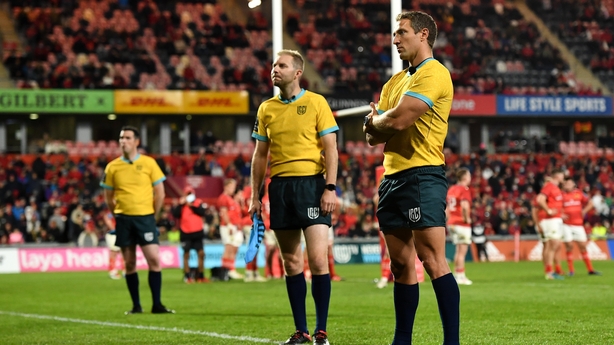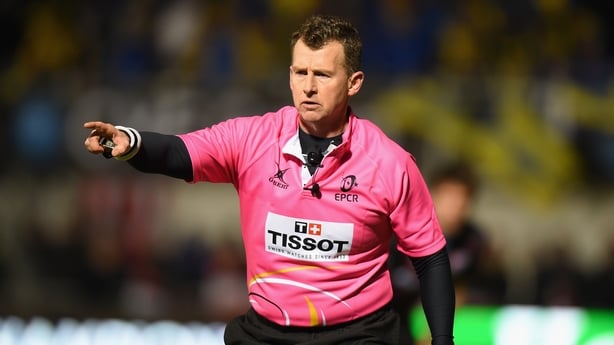After each round of rugby, there are numerous discussions in public forums, on and offline, regarding refereeing decisions that can swing the game one way or the other.
This is true of all sports if you look at how VAR has affected the Premier League, or some of the stewards enquiries in Formula One.
We want to continue to have heated debates and discussions. The match itself is only one aspect of the sport, the events within the game light up conversations for the rest of the week.
It's part and parcel of any game.
However, with the danger surrounding rugby incidents and decisions, I feel it’s time that the stakeholders of the game become more aligned in their perception of the big decisions.
When I say stakeholders, I don't mean those on the boards deciding the discourse of the laws.
I mean the public, those employed in the game and the referees. Everyone has a different agenda which changes the narrative surrounding foul play, big decisions and the perception of the referee’s language.
The day-to-day stakeholders include supporters, players, ex-players, coaches and the referees among others. These are the most important people for me when it comes to the lack of agreement in public discourse.
The moments in the game that I’m particularly focused on are those that carry a high degree of danger. The Malakai Fekitoa high tackle against Ulster resulting in a yellow card, which may be a red on a different day with another referee.
🟨 A second yellow card for Munster, this time Jean Kleyn for a high challenge on Jamie Osborne
— RTÉ Sport (@RTEsport) October 22, 2022
📺 👉 https://t.co/b2OI4O7lx9
📱 👉 https://t.co/b0WmWg9xTJ
📻 👉 https://t.co/Od8FxntrpN pic.twitter.com/XvyCZiz4kM
The Jean Kleyn incident with Leinster's Jamie Osborne, a collision in the air involving a London Irish and Harlequins player, the horrible high shot that resulted in a feeble yellow card in the Perpignan and Lyon game.
These incidents happen every weekend.
In the past, rugby has led the way in terms of discipline towards the referee and the clarity in decision making.
You could buy a referee’s radio as far back as twenty years ago where you could hear the referee’s discussions and decision-making while in the stadium so the supporters could get an insight into the communication involved between officials and players.
The TMO discussions are front and centre when watching on tv as well and there’s clear evidence that rugby has never shied away from a transparent view of the referee and foul play decisions.
However, I feel we are now at a standstill and more can be done.

There’s certainly a fine line and referees need to be protected from public bashing, much like clubs do to protect their own players in front of the media as well, but I think there’s a place in the game to get the referee’s thoughts on what happened in the game.
We get interviews from captains, player of the match, coaches, in-game interviews with support coaches, yet we never get a conversation with the referees.
It would be great to get the opinion of the referee after a game, when they have had a chance to get their thoughts together. I don’t mean to start this process with a controversial decision and to put them on the stand in front of an audience, but this could easily be started in non-controversial ways with a clear level of understanding between the interviewers and the referee’s union, or even done in hindsight on review programs.
As a coach, I have always found it useful to have conversations with referees and I have always got on well with those that have allowed a balanced discussion and are open to a certain level of questioning so we as coaches can bring those learnings into subsequent match-days and team meetings.
These discussions get passed on to players.
With a greater understanding of the game and the perception of the referee’s decision-making process, the players should start to toe the line a bit better when it comes to the law. They will at least understand when they are in the wrong and frustration will be reduced for both parties.
I understand that a private conversation and a full-on live interview with the referee might be poles apart, however, I feel we can learn from the football analysis shows where former top-level referees are brought on to give their opinion on controversial verdicts and can explain their decisions.
Former referee Nigel Owens was used as co-commentator for a period, but it was short-lived and I don’t feel other referees would yet be afforded the opportunity.

Owens was a communicative referee and his personality has allowed him the opportunity to commentate on a live match.
It might not have been perfect, but it could have opened the door for much clearer interaction with referees before it ever turns into a blame game.
Start with retired referees who no longer have the same skin in the game, but have the experience to put forward a logical reasoning around high-pressure decisions in competitive matches.
Former players comment on current players, so I don’t see why referees can’t operate in a similar fashion.
There are certain cues that referees look for when coming to a decision and may seem like shortcuts when you listen to the debate live.
"Was there foul play? Where was the initial contact? Was there a high degree of danger? What are the mitigating factors?"
But these aren’t shortcuts, they are cues to speed up the decision-making. This is also done at scrums and breakdowns for example, because it is difficult to police every part of the law book.
Players also have cues.
If the opposition winger is high in the defensive line, then communication will come in for the out-half to kick to the corner. If the opposition scrum-half is playing high in the defensive line, then it may open up chip space.
It’s a similar concept to allow for fast and accurate decisions to be made.
Coaches already have access to referee conversations which allows a deeper understanding of the laws as they are perceived by referees. It would be no harm if the supporters of the game were afforded a level of visibility with the officials as well so we can be much more aligned in terms of what’s really happening.
I don’t want to take the discussion out of the events, that will happen regardless because there will still be differing perceptions.
However, providing a deeper insight and clarity into the long list of laws that the game holds would help the supporters to enjoy the spectacle a bit more, buy into some of the harsher sanctions and also provide less pressure by way of a public bashing for the referees.
The law book is difficult enough at times even for professional players and coaches.
Everyone else could do with a hand understanding them too.


